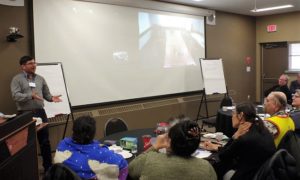Northern Ontario School of Medicine cross-border program underway

By Rick Garrick
THUNDER BAY—The Northern Ontario School of Medicine’s (NOSM) social accountability mandate was one of the issues brought forward during an April 19 meeting between NOSM and University of Minnesota Medical School Duluth (UMMSD) representatives.
“We were reminded here today that back when the medical school started, there was strong support from Indigenous communities, Indigenous leadership and political organizations and we must maintain that strong support,” says Darrel Manitowabi, NOSM’s interim director of Indigenous Affairs. “We learned today what we need to do to fulfill that original intent and spirit of collaboration.”
The leaders, faculty, staff and community stakeholders from UMMSD and NOSM met at Lakehead University in Thunder Bay as part of a cross-border program aimed at improving the health and educational opportunities of Indigenous people in northern Ontario and northern Minnesota.
“Some of the key points I heard are the issue of having Indigenous faculty at the Northern Ontario School of Medicine to ensure that all faculty are aware of Indigenous issues and not only students,” Manitowabi says. “There needs to be more political partnerships — there are limits to what NOSM can do. We also spoke about the need to find pathways into NOSM, right from the young child’s age and education from Junior Kindergarten to Kindergarten right to NOSM, and we need to build that capacity. And we also learned that we must recognize traditional ways of knowing, healing and knowledge.”
The meeting was the first of four planned meetings between NOSM and UMMSD, including two at UMMSD and two at NOSM.
“The Centre of American Indian and Minority Health (CAIMH at the University of Minnesota) has been dedicated to increasing the number of Native physicians in the United States for over 40 years,” says Mary Owen, CAIMH’s director. “We’ve been doing a pretty good job of it, so it just seemed natural for us to come up here and share some experiences and gain some insights on what you folks are doing up here.”
Owen says UMMSD has graduated more than 200 Native physicians over the past 40 years.
“Although we are continuing to raise more Native doctors, it’s just as important that we raise awareness of the health issues [affecting] Native people, so that is what we are concerned with — the overall outcomes for Native people,” Owen says. “The bigger issue for Native health is the same problems that [we see] all over the world — poverty. That is the bottom line, so we are just tapping the area that we can impact. We can’t change poverty — we can try to impact it in different ways.”
The meetings are designed to provide an exchange among cross-border experts in Indigenous health profession programs and ideas on mentorship programs for undergraduate and postgraduate learners, including students, residents and faculty, as well as to compare models for health research with Indigenous communities and to examine each school’s ties and relationships with Indigenous communities.
“We are pleased to welcome our colleagues from the University of Minnesota Medical School Duluth to the Northern Ontario School of Medicine as part of our ongoing efforts to exchange knowledge about the issues currently facing Indigenous peoples in northern Ontario and Minnesota,” says Roger Strasser, NOSM’s dean and CEO. “This meeting will bring together a spectrum of experts whose insights and ideas will help fulfill [NOSM’s] mandate to provide culturally safe care and education to these populations.”
The goal of the program is to provide a framework to create a First Nation and Métis Centre of Excellence for NOSM based on the CAIMH model.


